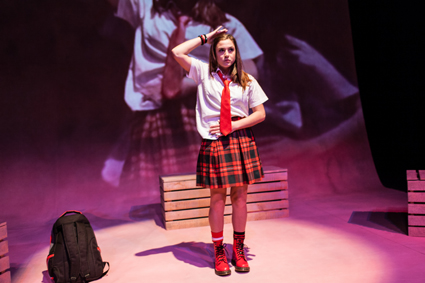Social media demons
Benjamin Brooker: Phillip Kavanagh, Jesikah

Kate Cheel, Jesikah
photo Sia Duff
Kate Cheel, Jesikah
Depending on which study you read, social media networking may or may not have an improving effect on the mental health of adolescents. Outside of the academy we hear a lot about the web’s risks for young people—cyber bullying, sexual predation, ‘Facebook depression,’ exposure to inappropriate advertising and content—and not much about why so many young people are drawn to it in the first place.
Jesikah, the titular (anti-)heroine of Phillip Kavanagh’s play, performed in this production with persuasively youthful élan by Kate Cheel, is a digital native, a permanently restless member of the iGeneration. Like many of her peers, she has probably already deserted Facebook for mobile messaging apps like Snapchat, which at least she knows her mum (Elizabeth Hay) won’t have figured out how to use yet.
But most of Jesikah’s engagement with social media revolves around the uploading of videos in which, unimpeded by notions of privacy or propriety, she sounds off about her teachers, her friends, her hobbies and, most of all, her endlessly shifting template for personal fame: rock star, actor, whiskey-soaked writer. Online users with names like DemonToaster and OpenSeeSaw variously applaud and troll Jesikah’s posts, her sense of self-worth suspended like a Damoclean Sword between the two extremes.
Her real-world BFF is the seemingly squeaky-clean Denise (also Hay), whose relationship with Jesikah’s internal world—riddled with anxiety and fear of rejection and failure—remains murkily ambiguous throughout. Olivia Zanchetta’s design unobtrusively supports the idea that Jesikah’s headspace is insistently inner-directed, the teenager standing out in punkish red and black while Denise, Jesikah’s mum and her drama teacher Miss H (Hay again) blend into the set’s pinkish-grey wash.
Kavanagh’s script is busy and the dialogue noisy in just the right ways, effervescent with teenage buzzwords and alert to the heightened dynamics and emotional stakes of close high school friendships. The play’s pivot points—heavily accentuated by director Nescha Jelk through an almost dizzying telescoping of the action of the final, increasingly shorter scenes—lie in what in Jesikah’s head are betrayals of her friendship and the passing over of her talents. Fixated like Narcissus on her own (social media) reflection, Jesikah resorts to self-harm as her personality begins to break down, the play taking an altogether darker turn. Her ever more desperate attempts to attract online hits have both a comic and tragic dimension.
But what exactly is Jesikah’s problem? An undistinguished teenager has transformed into an enfant terrible by the play’s end, a trajectory with powerful dramatic motion but that leaves too little explicated. I wanted a clearer sense of the source of anguish in Jesikah’s life, to know how much Kavanagh thinks social media has to answer for in terms of its hold on still-developing minds, and how much of Jesikah’s profound disquiet stems, by contrast, from elsewhere. Given social networking’s relative infancy, the jury remains out on many aspects of its cognitive impact but I can’t help but feel an opportunity may have been missed with Jesikah, rewarding though it is, to mount a stronger case either way.
–
State Theatre Company of South Australia, Jesikah, writer Phillip Kavanagh, director Nescha Jelk, performers Kate Cheel, Elizabeth Hay, designer Olivia Zanchetta, lighting Ben Flett, sound Will Spartalis; Hopgood Theatre, Noarlunga, 9 May; Space Theatre, Adelaide 27-31 May
RealTime issue #121 June-July 2014 pg. 44






